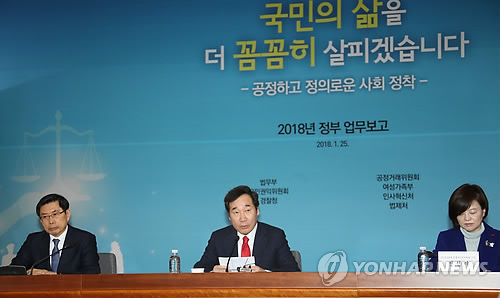The Fair Trade Commission said it will impose stronger sanctions against conglomerates that funnel contracts and business orders to their affiliates, while stepping up investigations into appropriation of technologies and abuse of intellectual properties that they said hinder fair competition of innovation.
“In order to prevent abusing economic power of large companies, we will strictly impose sanctions on chaebol’s unfair intersubsidiary dealings that can lead to expedient corporate succession and bring damages to SMEs,” the FTC said.
The announcement came during a meeting Thursday presided over by Prime Minister Lee Nak-yeon to share each ministries’ plans and goals for 2018. The FTC’s reporting session was joined by the Justice Ministry, the Anti-Corruption & Civil Rights Commission and the National Police Agency, among others.
The FTC has already been taking steps against the practice. This month, the commission imposed a fine of 10.7 billion won ($10 million) on local distiller HiteJinro for funneling contracts to companies its ownership family also owns.
“We want to give a message to conglomerates that it is difficult to inherit fortunes and honor expediently. The mere news of FTC‘s investigation could mean damage to the reputation (of the companies),” FTC Chairman Kim Sang-jo said in an interview with a local media outlet this month, referring to the HiteJinro case.
The FTC is now looking into conglomerate group Daelim and food company Harim whether they are also involved in unfair intersubsidiary dealings.
The antitrust watchdog also announced during the briefing, “We will investigate profit structure and the system of corporate foundations and holding companies set by conglomerates to prevent expedient expansion of controlling power of owner families.”
The corporate foundation and holding companies have been criticized for strengthening ownership families’ controlling power and for being a channel to pocketing profits.
The corporate foundations are mostly set up with the aim of contributing to society through scholarships or research funds. The subsidiaries donating money to the foundations are thus given various tax benefits. Some families are reported as having used the foundations to reduce inheritance and gift taxes or strengthen the family’s power.
In February of 2016, Samsung Life Public Welfare Foundation bought 2 million shares of Samsung C&T to sever the circular shareholding system following the merger of Samsung C&T and Cheil Industries. This made the head of the foundation and Samsung Electronics Vice Chairman Lee Jae-yong increase his controlling power over Samsung C&T.
The FTC’s announcement reflects Kim’s changing stance on conglomerates since he took office six months ago. In his inaugural address, he implied the necessity of conglomerate reform, but did not directly target conglomerates. Kim expected voluntary reform from Chaebol.
However, things have changed in recent months. In November, Kim said he was “doubtful about conglomerates’ willingness to reform” during a meeting with CEOs of the nation’s top five groups. Last month, the FTC urged Samsung SDI to unload 4 million shares of Samsung C&T to impose not only financial burden on Samsung but to also weaken the conglomerate’s de factor leader Lee Jae-yong’s control over the group.
By Shin Ji-hye (shinjh@heraldcorp.com)






